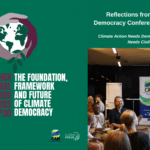Amidst the public health turmoil caused by the COVID-19 pandemic, Governments’ prime attention is directed towards finding ways to limit the number of fatalities and prevent a collapse of public health systems. At the same time, the international political agenda has been shaken, with major events, such as the UN Climate Change Conference COP26, being postponed.
However, 2020 is set to remain a vital year for climate action and a major test for the Paris Agreement. In 2015, all Parties to the Agreement have decided to revisit their greenhouse gas emission reduction pledges for 2030 (also known as NDCs, Nationally Determined Contributions), by 2020. Throughout the lockdown period, EU political leaders have underlined the need to stick to this commitment and increase the EU’s 2030 climate target before the end of this year.
A large majority of EU Member States have publicly called for making the European Green Deal the heart of Europe’s response to the recovery and committing to increase the Union’s 2030 climate target before the end of the year. In order to limit temperature rise to 1.5°C above pre-industrial levels, a central objective of the Paris Agreement, it remains vital for the global community that emissions between now and 2030 are substantially reduced, as failure to do so will cause irreversible damage to the global ecosystem and to generations to come.
In order to get there, we are facing two major challenges this year:
-
Raising the ambition of the 2030 climate target to a sufficient high level so as to be in line with the Paris Agreement’s 1.5°C objective; and
-
Achieving a political agreement at European Council level in time to honor the agreed 2020 deadline for submission and make next year’s COP26 a success.



